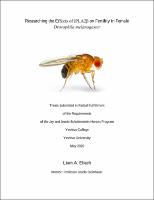Please use this identifier to cite or link to this item:
https://hdl.handle.net/20.500.12202/5652Full metadata record
| DC Field | Value | Language |
|---|---|---|
| dc.contributor.advisor | Steinhauer, Josefa | - |
| dc.contributor.author | Eliach, Liam A. | - |
| dc.contributor.author | Yeshiva University, degree granting institution. | - |
| dc.date.accessioned | 2020-06-12T19:43:18Z | - |
| dc.date.available | 2020-06-12T19:43:18Z | - |
| dc.date.issued | 2020-05 | - |
| dc.identifier.citation | Eliach, Liam A. Researching the Effects of iPLA2β on Fertility in Female Drosophila melanogaster. hesis Submitted in Partial Fulfillment of the Requirements of the Jay and Jeanie Schottenstein Honors Program. NY: Yeshiva College. Yeshiva University, May 2020. Mentor: Professor Josefa Steinhauer. | en_US |
| dc.identifier.uri | https://hdl.handle.net/20.500.12202/5652 | - |
| dc.description | Senior honors thesis. Open Access. | en_US |
| dc.description.abstract | In the United States, 10–15% of couples report having trouble conceiving. Although two thirds of infertility cases have known causes, the remaining one third of cases have yet to be identified with specific physiological and biochemical processes. The goal of this thesis is to explore one potential cause of infertility in fruit flies and then extrapolate the results to shed light on causes of human infertility. Previous studies have indicated that the iPLA2β gene, which codes for a calcium-independent phospholipase, is implicated in infertility in mice and Drosophila. In the Steinhauer lab it was demonstrated that homozygous null iPLA2β female Drosophila exhibit decreased fertility when compared to their control counterparts. I performed egg laying assays with control and null iPLA2β female Drosophila, which showed reduced egg laying by iPLA2β females, confirming the link between iPLA2β and fertility. Then I dissected control and mutant Drosophila ovaries and utilized antibody staining techniques to determine the prevalence of apoptosis proteins and germline stem cells in both the control and mutant lines. The results of my research indicated that although null iPLA2β female Drosophila lay fewer eggs than the control females, they exhibit similar levels of apoptosis proteins and germline stem cells. Although these two proposed mechanisms do not explain reduced fertility in Drosophila, this research has paved the way for future research to explore other potential mechanisms and has enhanced our understanding of the link between iPLA2β and infertility. | en_US |
| dc.description.sponsorship | Jay and Jeanie Schottenstein Honors Program | en_US |
| dc.language.iso | en_US | en_US |
| dc.publisher | New York, NY: Yeshiva College. Yeshiva University. | en_US |
| dc.rights | Attribution-NonCommercial-NoDerivs 3.0 United States | * |
| dc.rights.uri | http://creativecommons.org/licenses/by-nc-nd/3.0/us/ | * |
| dc.subject | Senior honors thesis | en_US |
| dc.subject | iPLA2β | en_US |
| dc.subject | fertility | en_US |
| dc.subject | Female Drosophila melanogaster | en_US |
| dc.title | Researching the Effects of iPLA2β on Fertility in Female Drosophila melanogaster. | en_US |
| dc.type | Thesis | en_US |
| Appears in Collections: | Jay and Jeanie Schottenstein Honors Student Theses | |
Files in This Item:
| File | Description | Size | Format | |
|---|---|---|---|---|
| LiamEliach-Honors-Thesis-Final.pdf | 551.62 kB | Adobe PDF |  View/Open |
This item is licensed under a Creative Commons License

